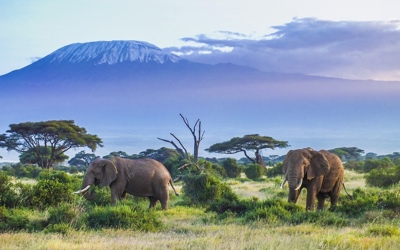
Mt Kilimanjaro Machame Route 9 Days
9 days
Instant confirmation
About this activity
Day 1 - Arrival
Arrive at Kilimanjaro Airport transfer to hotel in Moshi.
Day 2 - From Machame Hut to Machame Gate
• Trekking distance: 11 kilometers
• Trek time: 5 to 7 hours
• Environment: Montane forest
• Elevation: From 1800 meters to 3000 meters
Day 3 - From Machame Hut to Shira Hut
• Trekking distance: 9 kilometers
• Trek time: 4 to 6 hours
• Environment: Moorland
• Elevation: From 3000 meters to 3850 meters
Day 4 - From Shira Hut to Barranco Valley Camp via Lava Tower
• Highest point: 4600 meters (at Lava Tower)
• Trekking distance: 12 kilometers
• Trek time: 6 to 7 hours
• Environment: Semi-desert
• Elevation: From 3850 meters to 3950 meters
Day 5 - From Barranco Valley Camp to Karanga Valley Camp
• Highest point: 4200 meters (top of the Barranco Wall)
• Trekking distance: 7 kilometers)
• Trek time: About 4 hours
• Environment: Alpine desert
• Elevation: From 3950 meters to 3930 meters
Day 6 - From Karanga Valley Camp to Barafu Hut
• Trekking distance: 6 kilometers
• Trek time: Around 3 hours
• Environment: Alpine desert
• Elevation: From 3930 meters to 4600 meters
Day 7 - From Barafu Hut to summit Uhuru Peak, descent to Mweka Camp
• Highest point: 5895 meters (Uhuru Peak)
• Trekking distance: 20 kilometers (7 kilometers ascent / 13 kilometers descent)
• Trek time: 12 to 15 hours (6 to 8 hours ascent / 6 to 7 hours descent)
• Environment: Alpine desert/Volcanic scree/Ice-capped summit
• Elevation: From 4600 meters to 3100 meters
Day 8 - Descent from Mweka Camp to Mweka Gate, return to hotel
• Trekking distance: 8 kilometers
• Trek time: 3 to 4 hours
• Environment: Montane forest
• Elevation: From 3100 meters to 1800 meters
Day 9 - Departure
Read more
Show less
Arrive at Kilimanjaro Airport transfer to hotel in Moshi.
Day 2 - From Machame Hut to Machame Gate
• Trekking distance: 11 kilometers
• Trek time: 5 to 7 hours
• Environment: Montane forest
• Elevation: From 1800 meters to 3000 meters
Day 3 - From Machame Hut to Shira Hut
• Trekking distance: 9 kilometers
• Trek time: 4 to 6 hours
• Environment: Moorland
• Elevation: From 3000 meters to 3850 meters
Day 4 - From Shira Hut to Barranco Valley Camp via Lava Tower
• Highest point: 4600 meters (at Lava Tower)
• Trekking distance: 12 kilometers
• Trek time: 6 to 7 hours
• Environment: Semi-desert
• Elevation: From 3850 meters to 3950 meters
Day 5 - From Barranco Valley Camp to Karanga Valley Camp
• Highest point: 4200 meters (top of the Barranco Wall)
• Trekking distance: 7 kilometers)
• Trek time: About 4 hours
• Environment: Alpine desert
• Elevation: From 3950 meters to 3930 meters
Day 6 - From Karanga Valley Camp to Barafu Hut
• Trekking distance: 6 kilometers
• Trek time: Around 3 hours
• Environment: Alpine desert
• Elevation: From 3930 meters to 4600 meters
Day 7 - From Barafu Hut to summit Uhuru Peak, descent to Mweka Camp
• Highest point: 5895 meters (Uhuru Peak)
• Trekking distance: 20 kilometers (7 kilometers ascent / 13 kilometers descent)
• Trek time: 12 to 15 hours (6 to 8 hours ascent / 6 to 7 hours descent)
• Environment: Alpine desert/Volcanic scree/Ice-capped summit
• Elevation: From 4600 meters to 3100 meters
Day 8 - Descent from Mweka Camp to Mweka Gate, return to hotel
• Trekking distance: 8 kilometers
• Trek time: 3 to 4 hours
• Environment: Montane forest
• Elevation: From 3100 meters to 1800 meters
Day 9 - Departure
Included
- Transfers to/from Kilimanjaro Airport
- Hotel on a bed and breakfast basis the night before and after the climb
- Adequate number of guides, porters, and cooks
- All park fees, camping fees, rescue fees, and team fees
- Wages for guides, porters, and cooks
- Transfer to/from the route gates
- Sleeping tent, dining tent, privacy tent
- Crew equipment
- Complimentary oxygen cylinder
- Food and purified water during the trek
- Breakfast
- Lunch
- Dinner
- Snacks
- Bottled water
- Coffee and/or Tea
Not included
- Tips for guides, porters and cooks
- Medical insurance
- Tanzanian visa and vaccinations
- Medication, energy food & beverages
- Alcoholic and soft drinks
- Personal gear including rain gear, trekking poles, sleeping bags etc
- Lunch and dinner at the hotel
- Single room supplement upon request
Additional
- Confirmation will be received at time of booking
- Not wheelchair accessible
- Vaccinations
- The US Center for Disease Control and Prevention recommends the following vaccinations: Malaria, Yellow Fever, Typhoid, Hepatitis A, Hepatitis B and Rabies. Yellow Fever vaccination is required by the Tanzanian Government when entering the country from an infected area and you may be asked to show your vaccination record. Consult with your doctor about any additional vaccinations or medications concerning your personal circumstances.
- Visa Requirements
- In order to enter Tanzania most nationalities will need a passport and visa. The passport must be valid for 6 months after the intended length of stay. Visas can be obtained at the airport upon arrival, or at the Tanzanian Embassy in your respective country prior to departure. The price for a visa varies depending on citizenship, with the cost for US Passports being $100, and most European Passports $50. Detailed visa and passport requirements pertaining to individual countries can be found on the Tanzanian Embassy Website designated for the particular country.
- Medical Check-up
- Reaching Uhuru Peak requires great physical effort especially when getting to higher altitudes. Because trekking at high altitude can exacerbate any pre-existing medical conditions, a physical check-up is recommended for every client. While hikers with high altitude experience most likely are already aware of their physical condition, for those clients without prior hiking experience, a physical check-up is of utmost importance.
- What to bring:
- Travel Documents
- Valid passport and visa
- Airline ticket
- International health card with immunizations
- Travel insurance
- Medical insurance
- US $ cash/ Travelers Checks/ Credit Card
- Essential Items
- Duffel bag or backpack large enough for all climbing gear and clothing to be carried by the porters
- An extra bag to be left at the hotel with items not needed on the mountain
- Small luggage locks - to lock zippers
- Day backpack - between 20 - 35 liters. Large enough to carry your water, camera, raincoat, lunch pack, snacks & warm clothing
- Sleeping bag, warm, four season
- Ski-pole / walking stick
- Water bottle / containers
- Hiking Gear
- Sun screen SPF 50 or higher
- Shorts
- Hiking pants
- Regular underwear
- T-shirts
- Raincoat or poncho
- High Altitude Gear
- Waterproof, breathable & windproof jacket (outer wear like
- Ventex, Gore-Tex or Jeantex)
- Waterproof, breathable & windproof pants (outer wear)
- Polar Fleece (middle layer)
- Thermal underwear (under layers)
- Mittens or warm gloves
- Glove liners (if necessary)
- One pair thermal (polartec) sox
- Balaclava or scarf
- Gaiters (optional)
- Thermal water flask
- Equipment
- Sun hat or similar (with a brim)
- Sun screen SPF 50 or higher
- Collapsible ski stick (optional but highly recommended)
- Water bottles or camel back (capacity at least three liters)
- Head lamp, good strong one with spare batteries and an extra
- light bulb
- Water purification tablets
- Sunglasses, good quality dark lenses for the climb with a securing strap
- Flashlight (torch) with spare batteries
- Footwear
- Water resistant semi-stiff hiking boots - mid weight boots work great
- Shoes for overnight camps - i.e. sneakers, running shoes, etc.
- Socks - several pairs for the climb
- Liner socks - to keep your feet dry and limit the risk of blisters
- Medical and First Aid Supplies
- Headaches- Sundols
- Altitude sickness - Diamox (if not allergic to sulpha)
- Diarrhoea - Imodium
- Nausea - Valoid
- Malaria - Prophylaxis
- Painkillers
- Muscular sprains
- Abrasions blisters and cuts - Plaster, bandages
- Antiseptic cream - Betadine
- Flu and colds
- Eye drops
- Insect repellent
- Personal Items
- Toilet kit (soap, tooth brush, toilet articles, wet wipes, etc.
- Towel
- Sun screen SPF 50 or higher
- Ziploc bags, to protect camera, binoculars, etc. from dust
- Toilet paper
- Money belt for passport and valuables
- This tour/activity will have a maximum of 15 travelers
Features
Original
55%
Sport
55%
Cultural
30%
Adrenaline
20%
Collections
This experience is part of these collections
You may also like









 See all 18 Collections
See all 18 Collections
Click to discover other experiences
See all
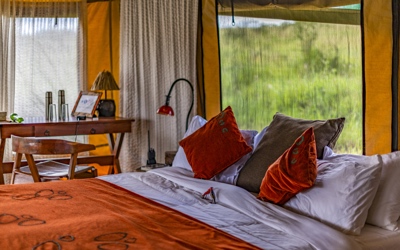
Collections
Lodge Adventure Tanzania
52 Activities
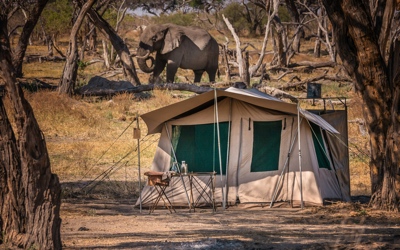
Collections
Camping in Safari
123 Activities
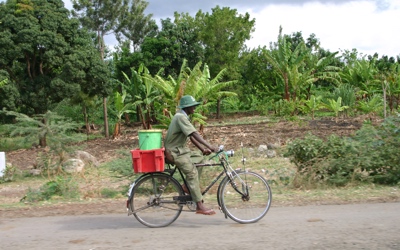
Collections
Cycling
11 Activities
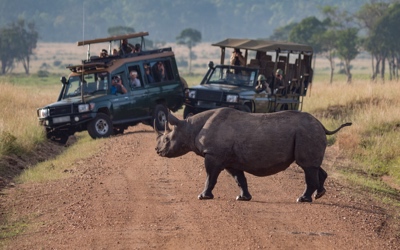
Collections
Safari
88 Activities
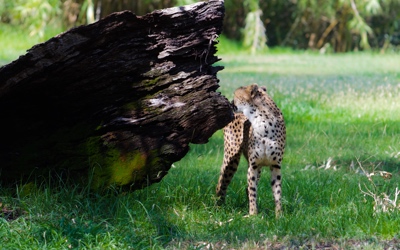
Collections
Big Cat
5 Activities
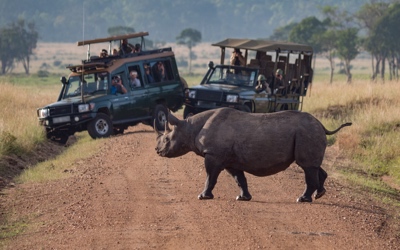
Collections
Budget Safari
63 Activities
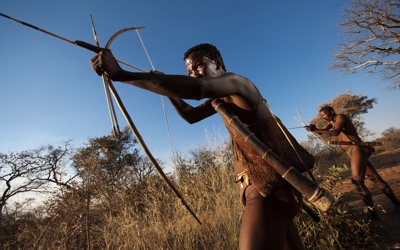
Collections
Bushmen Tribe
6 Activities
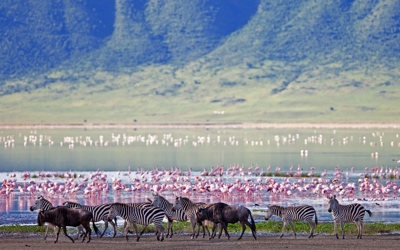
Collections
Ngorongoro Crater
196 Activities
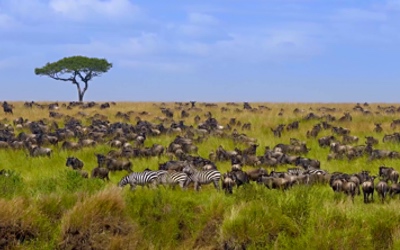
Collections
Migration Safari
58 Activities
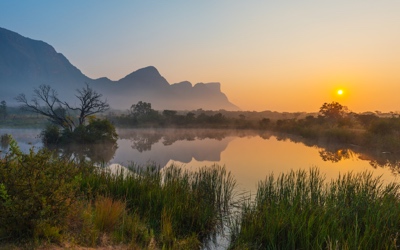
Collections
Original
13 Activities

